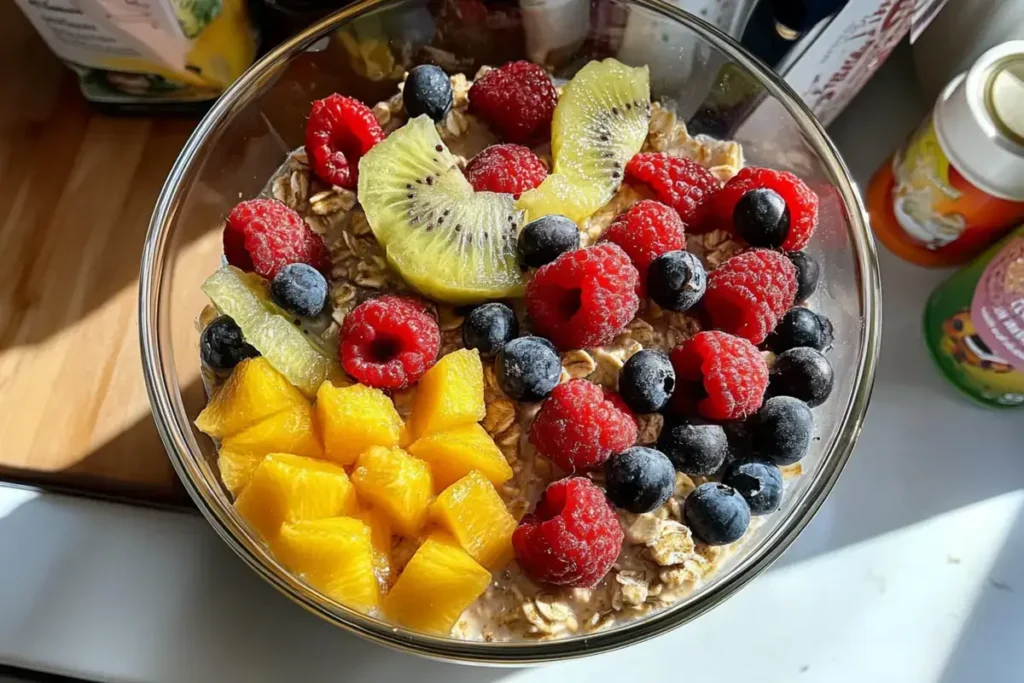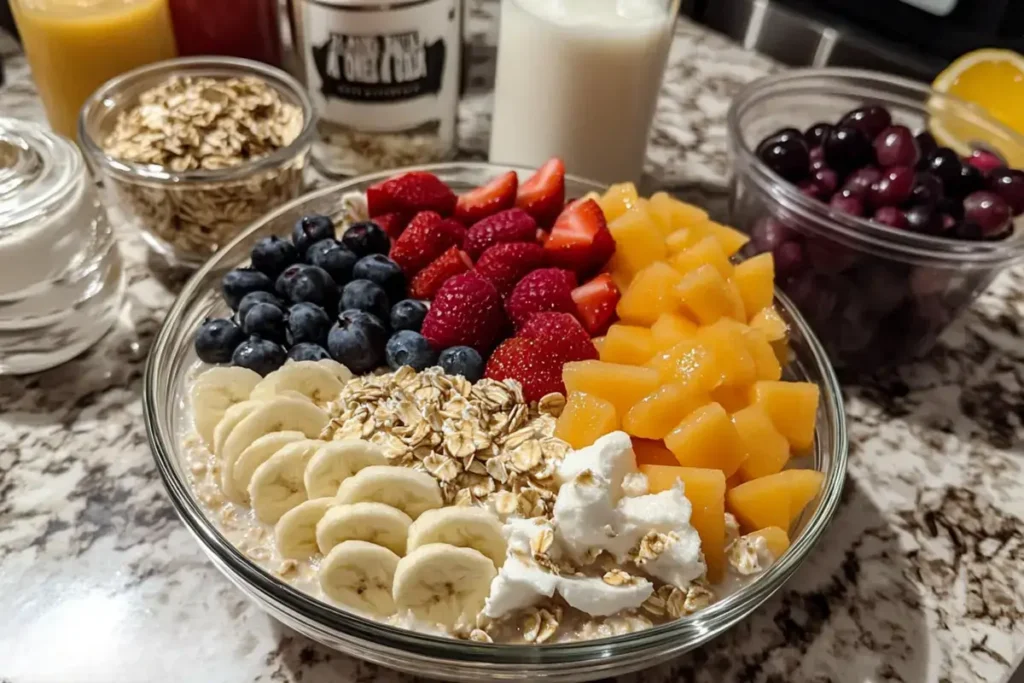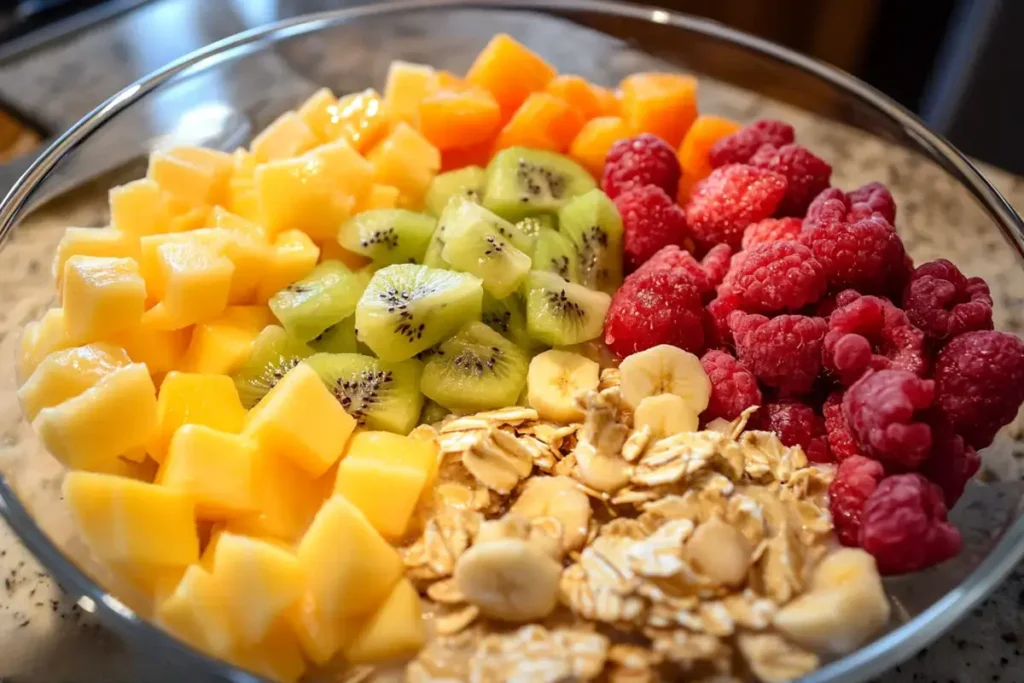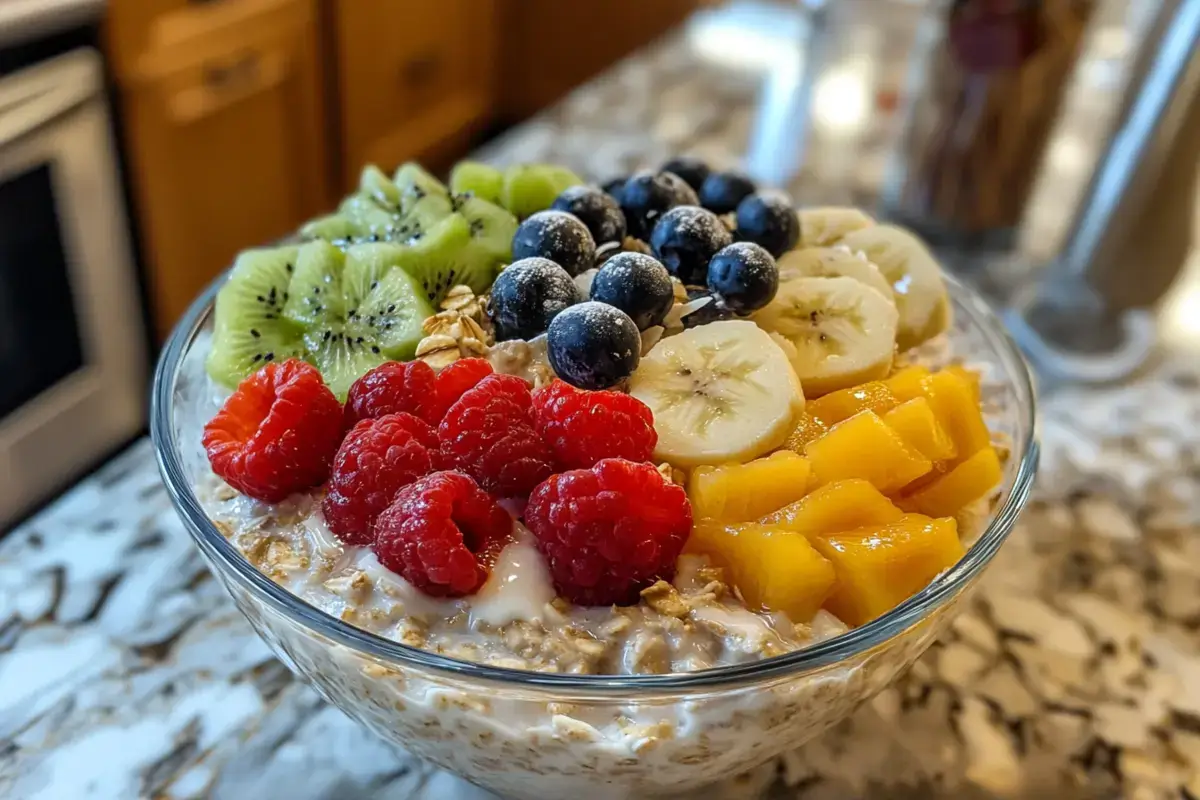Discover if overnight oats are healthy with our comprehensive guide covering nutritional benefits, tasty variations, and FAQs.
Overnight oats have become a popular breakfast choice. They are simple, delicious, and convenient for busy mornings. However, many people often ask, Is overnight oats healthy? This article aims to provide a thorough exploration of overnight oats, detailing their nutritional benefits, preparation methods, common mistakes, and more. By the end, you will have a clear understanding of how this dish can fit into a balanced lifestyle.
A Quick Overview
Many wonder if they should start their day with a ready-to-eat bowl of oats. The method of soaking oats in liquid—often milk or a milk alternative—creates a creamy texture without cooking. Is overnight oats healthy? The short answer is yes, especially when prepared with nutrient-rich ingredients and mindful portion sizes.
Overnight oats differ from traditional oatmeal because they require no stovetop cooking. Consequently, this process preserves more of the oats’ natural nutrients. Comparatively, cooked oatmeal might lose some heat-sensitive vitamins. However, the difference is not massive. The main advantage lies in convenience and flavor.
Oats are whole grains that contain fiber and protein. Fiber assists digestion, helps stabilize blood sugar, and supports heart health. Indeed, overnight oats are generally recognized as a wholesome choice because they utilize the inherent benefits of oats. Another key aspect is customization. You can add various fruits, seeds, and other ingredients that boost nutrient content. Therefore, overnight oats are a versatile and comparatively healthy way to start the day. Nonetheless, portion control matters to avoid going overboard on calories.
Nutritional Components
When analyzing Is overnight oats healthy? you must look at nutritional components:
- Carbohydrates: Oats are predominantly composed of carbs, chiefly starch and dietary fiber. These carbs release energy slowly, thus preventing sudden blood sugar spikes.
- Protein: Plain oats offer a moderate protein profile. For additional protein, you can include ingredients like Greek yogurt or protein powder.
- Healthy Fats: Adding nuts, seeds, or nut butters can increase your intake of monounsaturated and polyunsaturated fats.
- Vitamins and Minerals: Oats contain significant amounts of B vitamins, iron, magnesium, and zinc. These micronutrients support various bodily functions, including energy production and immune health.
- Fiber: The fiber in oats is primarily soluble. Specifically, beta-glucan in oats can lower cholesterol levels and promote a feeling of fullness. Fiber can also improve digestion and reduce hunger levels.
Additionally, soaking oats overnight may enhance their digestibility. The soaking process initiates the breakdown of starches and reduces phytic acid, making certain nutrients more accessible. Nonetheless, the effect of soaking alone is not a magic fix. Overall nutritional impact depends on your add-ins. For instance, sweetening with processed sugar negates certain health benefits. Conversely, using fresh berries or mashed banana can add vitamins and antioxidants. Hence, the base of oats is nutritious, but your ingredient choices matter significantly.
Main Benefits
People searching for ways to improve their diet often ask, Is overnight oats healthy? Primarily, overnight oats bring several advantages:
- Weight Management: Oats can be quite filling. Consequently, you are less likely to snack excessively. When combined with healthy toppings like berries, yogurt, or seeds, overnight oats can offer a balanced meal.
- Blood Sugar Regulation: Oats may assist in maintaining stable blood sugar levels. Their soluble fiber moderates sugar absorption. For people with certain dietary restrictions, using unsweetened milk alternatives helps as well.
- Heart Health: The beta-glucan in oats has been linked to lowering LDL cholesterol. Likewise, a diet rich in whole grains is often associated with reduced cardiovascular risk.
- Gut-Friendly: Fiber promotes a healthier digestive system. Additionally, combining oats with probiotic-rich ingredients like yogurt can further benefit gut flora.
Overnight oats become especially beneficial if you add nutrient-dense elements. For instance, seeds like chia, flax, or hemp supply extra omega-3 fatty acids. Fresh fruits add antioxidants, while nuts offer protein and healthy fats. Altogether, overnight oats are a perfect canvas for a range of toppings that can boost their nutritional profile.

Common Mistakes
Despite their many benefits, it is easy to undermine the healthiness of overnight oats through a few common errors:
- Over-Sweetening: Many recipes call for honey, syrup, or sugar. However, adding too much sweetener can turn a healthy breakfast into a dessert. Moderation is crucial.
- Lack of Fiber: If you only use oats and a sweetener, you miss out on extra fiber sources like seeds, fruits, and nuts. Consequently, your meal may be less satisfying and less beneficial for digestion.
- Unhealthy Toppings: Toppings like candy pieces or excessive amounts of chocolate chips diminish the overall nutritional value. Comparatively, natural sweeteners and fruit provide more vitamins.
- Storage Issues: Overnight oats typically last a few days in the fridge, but pushing it beyond that can affect freshness. Storing them in a sealed container is ideal.
- Using Low-Quality Ingredients: Opting for instant oats or heavily processed sweeteners might reduce nutritional benefits. Rolled oats or steel-cut oats are better choices.
In essence, you can ruin an otherwise healthy dish by making it too sugary or neglecting essential nutrient additions. Nonetheless, these mistakes are easily correctable by choosing the right ingredients and paying attention to quantities.
Tasty Variations
If you are worried about getting bored with the same breakfast, numerous flavor combinations will keep your overnight oats exciting:
- Classic Fruit Combos: Sliced banana, cinnamon, and a sprinkle of nuts create a sweet yet healthy mix. Berries are another popular choice, adding freshness and antioxidants.
- Protein-Packed Options: Stir in Greek yogurt, cottage cheese, or protein powder to boost protein content. This is particularly helpful for fitness enthusiasts.
- Vegan Alternatives: Use plant-based milk like almond or oat milk. Include chia seeds or hemp hearts for extra protein. Add coconut yogurt for creaminess.
- Indulgent Twists: A spoonful of cocoa powder with a dash of maple syrup transforms your oats into a chocolatey delight. For a tropical flair, add shredded coconut and diced pineapple.
Experimentation leads to new discoveries and helps avoid flavor fatigue. Moreover, you can tailor each recipe to meet specific dietary needs. Whether you want a low-sugar version or extra protein, there is a flavor profile to fit everyone.
Step-by-Step Preparation
Making overnight oats is straightforward. However, paying attention to detail helps guarantee a tasty result:
- Choose the Best Oats: Rolled oats are the standard choice. They absorb liquid well and become soft but not mushy. Steel-cut oats can also be used, though they may require a longer soak.
- Select a Liquid Ratio and Sweeteners: Typically, use a 1:1 ratio of oats to milk or milk alternative. Adjust according to your preference for thickness. For sweetness, consider natural options like mashed banana or a small drizzle of honey.
- Add-Ins for Flavor and Nutrition: This can include nut butter, chia seeds, flaxseeds, or unsweetened cocoa. Another approach is layering fruit pieces for extra color and taste.
- Overnight Soak: Place your mixture in a sealed container. Store in the refrigerator for at least six hours or ideally overnight. Consequently, the oats will soften and absorb the flavors.
- Morning Routine: Give the mixture a stir, then top with fresh fruit, nuts, or a sprinkle of spice. By doing so, you ensure a vibrant meal before heading out the door.
This procedure suits individuals who appreciate a grab-and-go option. Furthermore, it can help reduce morning stress, especially for families juggling work and school. Overall, the process ensures your oats are ready when you need them.
Tips and Tricks for Perfect Overnight Oats
Perfection lies in subtle adjustments. Here are some tried-and-true tips:
- Maintain Freshness: Prepare only as many servings as you can consume within 3–4 days. Afterward, quality may decline.
- Portion Control: Oats are healthy, but it is easy to overdo it. Use measuring cups or small containers to avoid oversized servings.
- Adjust Thickness and Sweetness: If the mixture becomes too thick, add a splash of liquid. Conversely, if it is too runny, reduce the liquid next time or stir in chia seeds.
- Storage Methods: Use airtight containers, like glass jars with lids. This prevents odors from the fridge from seeping in.
With these insights, you can create a consistent and enjoyable breakfast. Chiefly, the best approach involves experimenting to find your ideal combination. Because everyone’s taste preferences vary, do not hesitate to try new ingredients and variations.

Potential Downsides
Generally, overnight oats are beneficial. Nevertheless, certain issues may arise:
- Excess Sugar Consumption: Adding large amounts of syrup, chocolate, or sugary dried fruits can lead to a breakfast dessert. Moderation is key.
- Phytic Acid: Oats contain phytic acid, which can interfere with nutrient absorption. However, soaking helps reduce phytic acid. Consequently, it becomes less of a concern.
- Digestive Sensitivities: Some individuals might feel bloated after consuming oats, especially if they are sensitive to certain fibers or have celiac disease. Always check for gluten-free oats if needed.
Likewise, portion control must be considered. Even healthy foods can lead to weight gain if consumed in excess. Altogether, these downsides are manageable once you understand the correct preparation and portioning methods.
For Busy Mornings
If your routine involves rushing out the door, overnight oats can be a lifesaver. You prepare them the night before, so you do not need to cook in the morning. They are nutritious because they supply essential nutrients in a portable container. Therefore, you save time and still receive a wholesome meal.
Some people worry about sogginess or texture. Nonetheless, the soak creates a creamy consistency that many love. If you prefer crunch, add toppings right before eating. This balance keeps the dish vibrant and fresh. Eventually, you can tweak the ratio of liquid to oats until you find the texture you enjoy most.
A Good Addition for Athletes
Athletes frequently need consistent energy. Oats deliver complex carbohydrates that break down gradually, providing a sustained energy supply. Furthermore, adding protein powder or nut butter enhances muscle recovery and promotes satiety. For those training intensely, fueling the body with balanced meals is essential.
Because sports routines can be unpredictable, overnight oats provide convenience. You can customize nutrient levels, adjusting macros to meet specific athletic needs. Thus, if you are hitting the gym early, you can have a nutrient-dense breakfast readily available. Meanwhile, you skip the hassle of cooking and cleaning up in the morning.
in Family Meals
Families often struggle to accommodate varying tastes and schedules. Overnight oats solve this dilemma by offering endless customization. Each family member can add their preferred fruit, sweetener, or protein source. Undoubtedly, the entire household can benefit from a quick and nourishing meal.
Children may enjoy picking toppings, encouraging them to eat more vitamins and minerals. Moreover, it is cost-effective to buy oats in bulk. If you incorporate bananas, berries, or seeds, you add essential nutrients without major expense. Equally important, overnight oats accommodate dietary restrictions. For instance, plant-based milk suits lactose-intolerant or vegan family members.
Incorporating Overnight Oats Into Daily Life
Integrating overnight oats into your routine is straightforward. You can prepare multiple servings in mason jars, label them by flavor, and store them in the fridge. This approach ensures you have breakfast ready for the entire week. Consequently, it eases morning chaos and reduces meal planning stress.
Meal Prepping for Busy Individuals: If you often skip breakfast or resort to fast food, keep a few jars in the fridge. This eliminates excuses for poor morning nutrition.
Pre- or Post-Workout Snacks: Overnight oats can serve as a great pre-workout carb source or a post-workout meal when combined with protein. Hence, you can adapt your oats to match your training demands.
Family-Friendly Ideas: Let everyone mix their own jars. Because each jar is customizable, picky eaters can choose fun flavors while still enjoying a wholesome meal.
Through these methods, overnight oats can become a staple for various lifestyles. They fit into different dietary patterns, from weight loss plans to athletic performance regimens. Comparatively, few other breakfast choices are as flexible and easy to prepare.

Frequently Asked Questions (FAQs)
Are overnight oats healthy for weight loss?
Yes, they can be quite helpful if you manage portion sizes and choose nutritious toppings. Oats are rich in fiber, which fosters feelings of fullness. Consequently, you are less likely to snack or overeat. Adding lean protein sources and fresh fruit can further support a weight loss plan. Yet, be mindful of sweeteners, as excessive sugar can undermine your goals.
Is it healthy to eat overnight oats everyday?
In most cases, yes. Eating overnight oats daily can be healthy, especially if you vary the ingredients. Including different fruits, seeds, and protein options ensures you receive a wide range of nutrients. Nonetheless, pay attention to potential calorie overload from sweeteners or rich toppings. Ensure that you also maintain balance with other nutritious foods throughout the day.
What not to add in overnight oats?
Avoid items high in processed sugar, such as candy pieces or certain flavored syrups. These ingredients elevate sugar content and detract from the health benefits. Likewise, be cautious with highly processed cereal toppings that offer little nutritional value. Additionally, limit artificial sweeteners if possible, as they can lead to cravings for sweeter foods.
Are overnight oats too high in carbs?
Overnight oats do provide a considerable amount of carbohydrates. However, these carbs mostly come from whole grains and fiber. This type of carb can offer steady energy. If you follow a low-carb diet, adjust portion sizes or reduce the oats while increasing protein and fat sources. Comparatively, oats are healthier than refined grains, but portion control remains essential.
Conclusion
Is overnight oats healthy? If prepared with thoughtful ingredients and enjoyed in balanced portions, the answer is undoubtedly yes. The combination of fiber, protein, and essential vitamins makes overnight oats an appealing choice. Whether you are trying to lose weight, gain muscle, or simply streamline your breakfast routine, these oats can serve as a versatile solution.
In brief, overnight oats are easy, tasty, and supportive of overall well-being. The key lies in mindful ingredient selection and portion control. By understanding the nutritional benefits and avoiding common pitfalls, you can confidently incorporate overnight oats into your daily life. Above all, this breakfast will keep you fueled and satisfied, setting a positive tone for the rest of your day.

